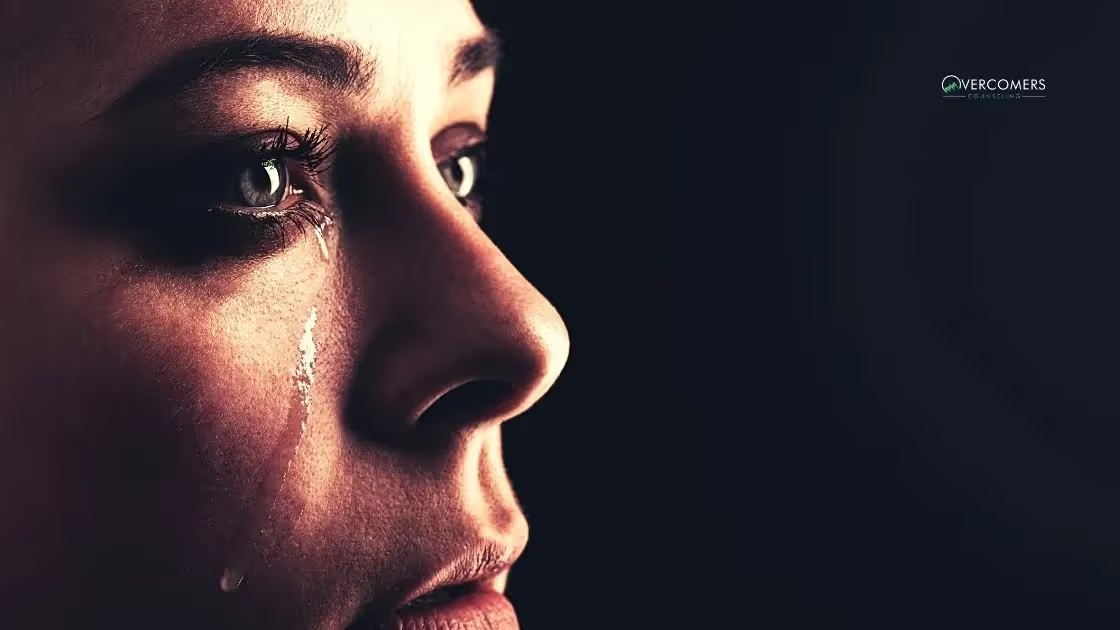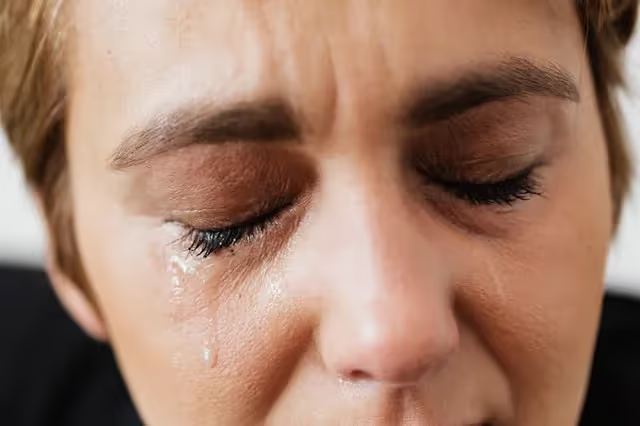Is it normal to cry over circumstances and situations we cannot control, or when we face fears and threats?Anxiety attack crying! Do anxiety attacks cause...

Is it normal to cry over circumstances and situations we cannot control, or when we face fears and threats?
Anxiety attack crying! Do anxiety attacks cause crying?
For many, the natural response to situations would be to shed tears or weep profusely.
I experienced anxiety attacks and crying during my days at medical school.
This would always precede my professional exam and my preparation for it.
Believe me, the pressures of medical school can do that to you; the race against time to finish the course content and be ready enough for both written and oral exams, messes with your head.
And anxiety attacks are never far off.
Normal as it may seem, it requires attention to maintain your focus and composure and achieve your set goals.
So how do you overcome anxiety attacks while trying?
Emotions, fears, and anxiety are not to be smothered with shame. It is okay to feel all the feelings.
However, one of the things that could help is talking to someone. You might likely need a bit of counseling to help you through the challenge.
Also, you might want to shift your focus for a while from anxiety triggers and meditate on the things that bring you joy and hope.
Anxiety Attack Crying could result from one or more of the following:
Experiencing anxiety crying can be incredibly overwhelming.
Here are practical steps to help you regain control
Step 1) Recognize the Signs
Understand that crying stimulates an emotional response in your nervous system.
This is your body's way of coping with feelings like stress, sadness, anger, or even fear.
Step 2) Breathe Deeply
Pay attention to your breathing.
Taking slow, deep breaths can soothe your nervous system.
Breathe in through your nose for four seconds, hold the breath for four seconds, and then breathe out through your mouth for four seconds.
Step 3) Ground Yourself
Shift your focus from negative thoughts to the present moment. U
se grounding techniques such as feeling the texture of an object or listening to soothing sounds.
Step 4) Acknowledge Your Feelings
Accept that it's normal to feel sad or anxious sometimes.
Allow yourself to cry for a few minutes if needed, but then gently remind yourself to focus on calming down.
Step 5) Relax Your Muscles
Anxiety and stress can make your muscles tense.
Practice progressive muscle relaxation by tensing and then slowly relaxing each muscle group in your body.
Step 6) Engage in Healthy Distractions
Distract yourself with activities that reduce stress, such as reading, walking, or listening to music.
These can help shift your focus away from what's triggering your tears.
Step 7) Talk to Someone
Share your feelings, sad thoughts, or other challenging moments with a family member or friend.
Talking about your emotions can be incredibly helpful. It's important to voice your feelings and seek support.
Step 8) Practice Self-Care
Ensure you get enough sleep, eat well, and engage in regular physical activity.
These healthy ways can significantly affect your emotional health.
Step 9) Seek Professional Help
If you experience frequent anxiety attacks or excessive crying, consider reaching out to a healthcare professional. A therapist can provide you with coping strategies and treatment options.
Step 10) Avoid Self-Harm
If you feel overwhelmed to the point of considering self harm, seek immediate help from a healthcare provider or therapist. Your safety is paramount.
Step 11) Mindfulness and Meditation
Engage in mindfulness or meditation practices. These can help calm your brain and reduce the symptoms of anxiety and panic attacks.
Step 12) Plan Ahead
Identify and avoid triggers that lead to feeling overwhelmed. Develop a plan for how to respond to these triggers in healthy ways.
It's essential to seek medical advice if symptoms persist.
Your mental health is just as important as your physical health, and professional help is always available.
Anxiety
This is based on fear of imaginary or imminent threats.
Anxiety elicits some of the body's strongest emotional responses.
These powerful emotional responses could trigger other responses including crying (Steimer, Thierry 2002).
Fear of the future, and fear of the unknown, can cause many to shed a tear or two.
It is a psychological response to anxiety.

Panic as a severe form of anxiety elicits even stronger emotions that can cause people to cry.
Anxiety attacks or panic refers to anxiety that occurs to the highest degree.
This triggers hormones that elicit tears.
Mental, emotional, and even physical stress could trigger anxiety attacks and crying, especially when there is little or no time to relax.
Chronic stress can lead to nervous system hypersensitivity (Mariotti, Agnese, 2015).
Most people experience emotional instability when chronically stressed.
This state of emotional instability often results in anxiety attacks and crying.
Medical experts have listed many reasons for this, including:
This results from a feeling of hopelessness, helplessness, and entrapment.
Berry and Jennifer (2018) noted that depression can lead to anxiety and crying episodes.
Many people who suffer from anxiety disorders also battle with this feeling of helplessness, hopelessness, and entrapment, which lead to depression and episodes of anxiety crying.
Anxiety attacks and crying can be side effects of many medications.
Experts have identified Beta-blockers, corticosteroids, antipsychotics, antidepressants, hormone-altering drugs, stimulants, anticonvulsants, Proton pump inhibitors (PPIs), statins, and anticholinergic drugs as common medications that cause crying as a side effect.
Different people respond in different ways to anxiety attacks.
A side effect triggered by an overwhelming physical or emotional experience.
Although some do not cry preceding, during, or after anxiety attacks, many others experience the emotion so intensely that it provokes tears (Rosmarin, 2011).
Sometimes, anxiety attacks happen for no obvious reason.
Dr. Abrar Hussain describes anticipatory anxiety and anxiety due to PTSD.
It is indeed possible to grow out of an anxiety attack by crying.
But to do this, the appropriate triggers need to be identified and addressed.
The first step to getting over anxiety attack crying would be to directly address the anxiety.
Take note of the root cause of the anxiety. Refuse to nurture it.
Replace an anxiety attitude with a healthy attitude.
Addressing your anxiety issue will reduce the spate of anxiety attacks crying and ultimately create a healthy mental state.
Several self-help resources could help with this, but I'd recommend going through anxiety management resources on this site.
Trends in the world today make people take up multiple jobs, struggle to meet deadlines, and have little time for relaxation.
It is only normal to sometimes respond to many of these situations with anxiety attacks by crying.
Create times to relax.
Go swimming.
Take deep breaths.
Work out.
And play some good music.
These will help calm your nerves and prepare you to tackle any challenges with fresh perspectives.
Change Or Stop Medications
If your current medication causes you anxiety or crying, you might need to speak to your doctor about a change in prescription.
Do not take any steps without first of all conferring with your doctor.
The attitudes and habituated behaviors we have imbibed are not exactly healthy for our mental health.
Emotions play a huge part in our daily lives and when not harnessed properly could result in depression and anxiety attack crying episodes.
For example, overreacting to situations can trigger emotional stress and consistency in this behavior will eventually lead to anxiety attacks and the associated crying episodes.
Research has shown that emotional stress triggers anxiety attacks and crying (Sanders, Robert, 2016).
A self soothe box contains some of your favourite things that you could focus your mind on to distract you from whatever is presently triggering anxiety attack crying.
Speaking to a professional anxiety disorder therapist could help you make behavioural and attitudinal changes that will help you overcome anxiety and its symptoms, including anxiety attack crying episodes.
Working with a professional anxiety disorder therapist is the most effective way to combat anxiety attack crying (David, Daniel, et al, 2018).
People frequently face situations that trigger anxiety attacks and crying.
This response, however, is based on individual perceptions of the degree of stress, threat or danger.
Researchers have proven that some anxiety attack crying spells happen for no reason or merely in anticipation of imaginary threats rather than imminent danger.
Anxiety attacks and crying can be overcome by employing the proven measures explained in this article.
You do not have to keep suffering the embarrassment that comes with anxiety attacks or crying.
Create a relaxed atmosphere around you, take out time to refresh yourself, take deep breaths, eat healthy, focus on the things that make you happy, and most importantly, speak to someone about your anxiety issues.
It's important that you feel comfortable discussing personal matters with your therapist in order to open up and get more out of therapy sessions; therefore finding someone who meets certain criteria like experience level, expertise areas, and personality is key when selecting a therapist who can give meaningful feedback about how best handle issues related to anxiety or other mental health concerns.
Other activities which have been found helpful in reducing both immediate feelings of anxiousness and long-term anxieties associated with chronic disorders include yoga, journaling, nature walks, art therapy, volunteering, and other low-stress activities. Additionally, developing a healthy lifestyle incorporating adequate sleep, physical activity, and nutritious meals can help reduce overall stress levels.
To reduce your anxiety, you can practice relaxation techniques such as deep breathing, progressive muscle relaxation, guided imagery, and mindfulness practices. Additionally, regular exercise has been found to be beneficial in managing stress and improving mental health.
Addressing anxiety is crucial because it can significantly impact your quality of life and overall well-being. Left untreated, anxiety can lead to more severe mental health issues, relationship problems, and difficulty functioning in daily life.
Ignoring anxiety can exacerbate symptoms and make it more challenging to manage over time. This can result in a negative impact on your personal, professional, and social life, leading to feelings of isolation and even depression.
Yes, Medicaid provides insurance coverage for therapy services specifically designed to help individuals struggling with anxiety, depression, and other mental health conditions.